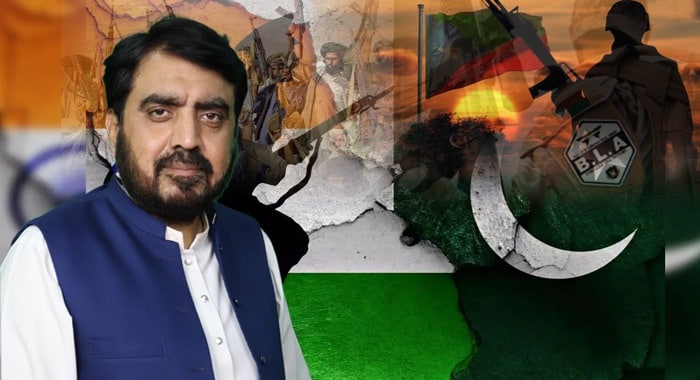In recent discourse among Pakistani political and strategic circles, a recurring theme echoes with unrelenting intensity: the belief that Pakistan is under constant threat—externally by traditional adversaries like India, and internally by elements allegedly manipulated by foreign powers. This worldview, as illustrated in the impassioned monologue above, reflects a deeply entrenched siege mentality that has defined much of Pakistan’s strategic posture since its inception.
The narrative begins with a historical grievance—India has “never forgiven us in the past, nor will it ever forgive us in the future.” This sentiment forms the bedrock of a broader suspicion that India, using both hard and soft power, seeks to undermine Pakistan’s sovereignty, identity, and development. It is a narrative that views regional diplomacy not as an avenue for cooperation, but as a battlefield of influence, espionage, and betrayal.
At the heart of this worldview lies a dual anxiety: the external threat of India and the internal decay fuelled by foreign interference. Reference is repeatedly made to India’s involvement in Afghanistan and Balochistan, citing past incidents such as the capture of Kulbhushan Jadhav as evidence of an ongoing covert war. These claims, whether exaggerated or grounded in specific cases, feed into a larger perception that national disunity is being orchestrated from abroad, with locals serving as unwitting instruments of a foreign agenda.
Yet, interestingly, there is also an odd note of gratitude extended towards Prime Minister Narendra Modi—seen paradoxically as a catalyst who has, through aggression or antagonism, forced Pakistanis to rediscover their national identity and potential. This moment of self-reflection, however, quickly gives way to renewed warnings: internal threats must be neutralized, and the nation must remain vigilant because “the war is ongoing. It has not ended yet.”
There is a persistent theme of psychological warfare—both inflicted by others and endured by Pakistan. Indian society, according to this view, is wounded psychologically by perceived military and moral defeats, and thus poised for irrational retaliation. This sets the stage for a potential flare-up, especially in Kashmir, which re-emerges in the narrative not just as a territorial dispute, but as a test of global morality and diplomatic sincerity.
Also Read: Army Chief Praises Pakistani Media for Responsible, Patriotic Role Amid Tensions with India
From here, attention shifts to international players—primarily the United States. The scepticism towards Washington’s intentions is palpable. Donald Trump’s inconsistent foreign policy, driven by economic opportunism rather than ideological loyalty, is framed as unreliable. The United States, the speaker argues, manipulates issues like Kashmir, Palestine, and Ukraine to suit its strategic interests, with little regard for the lives and struggles of those affected.
This deep-seated mistrust extends to broader global institutions and their selective moral compass. The international community, it is argued, is unlikely to hold India accountable for alleged water aggression or human rights abuses in Kashmir, simply because of India’s market size and geopolitical value. The conclusion is stark: Pakistan must rely on its own resolve, not international sympathy, to secure its interests.
China, by contrast, is viewed through a lens of cautious optimism. While border tensions with India are acknowledged, the absence of direct warfare is appreciated. The Pakistan-China alliance is painted as one of mutual benefit and strategic convergence, particularly in the face of American and Indian aggression. The transcript even implies that any instability inflicted upon Pakistan will be met with counter-pressure from China, a sort of balancing act in a regional cold war.
Finally, the monologue circles back to Donald Trump, framing him as a political showman whose policy shifts, from Syria to Saudi Arabia, are driven less by principle and more by transactional pragmatism. Yet, even his apparent victories, such as arms deals or easing tensions with former foes, are seen as part of a broader playbook to elevate American economic and geopolitical clout, often at the expense of global stability.
This worldview—laden with suspicion, interwoven with religious and historical analogies, and anchored in nationalistic pride—offers a revealing glimpse into the prevailing sentiment among segments of Pakistan’s political and media landscape. It is a narrative that underscores the strategic anxieties of a nation surrounded by complex geopolitical realities. While some of these fears are not without merit, the constant framing of global events through a lens of existential threat risks perpetuating a state of defensive paranoia.
For Pakistan to break free from this siege mentality, it will need more than vigilance and rhetoric. It will require a sober re-evaluation of both internal policies and external strategies—a move away from reactive posturing and towards proactive engagement rooted in regional stability, mutual trust, and socio-economic reform. Until then, the drums of war—be they physical, psychological, or ideological—will continue to beat loud in the background of national consciousness.





